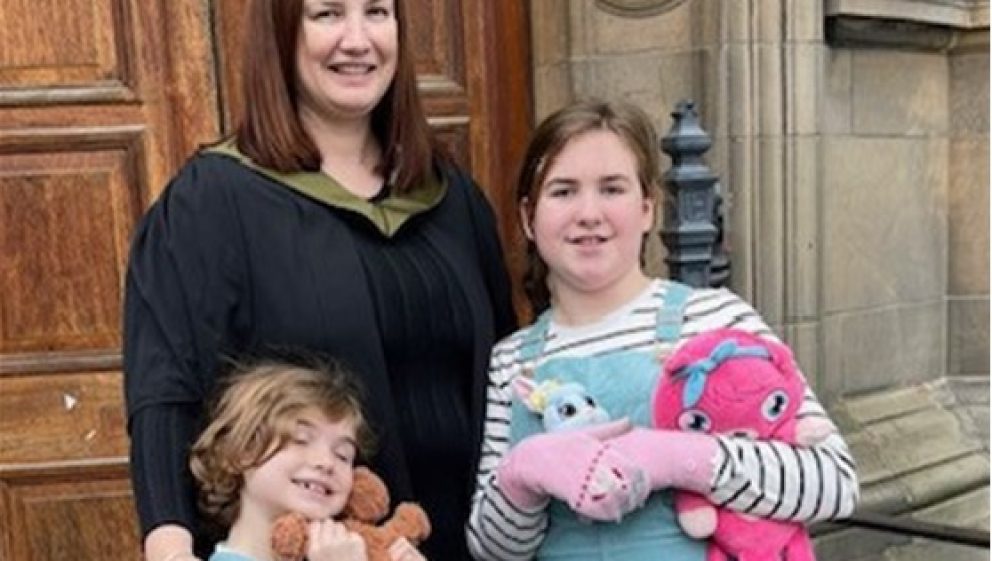Single mum Denise is seeing the benefits of studying pay off, after she completed an MSc research project in teacher education.
I have two daughters, and I’ve been a single parent for the past seven years. I separated when my children were quite small, the youngest was only seven months old. At the time I was working as a high school teacher, but for the last five years I’ve been on secondment in Higher Education, working with student teachers.
It’s always been an ambition of mine to study at an advanced level. But another motivating factor was that I’d been working on secondment for five years, and in order to gain a permanent contract there was a requirement to be working towards a Masters. An opportunity came up for an MSc (Research) studentship which would cover my fees and allow me to complete the qualification over two years part-time.
I knew it would be challenging balancing full-time employment and my children’s needs. It wasn’t a taught masters; instead I completed a research project investigating the early career experiences of new teachers in Scotland. So the process involved planning my project, reading around the topic and then gathering data by interviewing teaching graduates. The data analysis process was lengthy as I ended up with around 12 hours of interviews in total.
Studying during lockdown
I’d often work on my project at night after putting the girls to bed – and that was exhausting as my children are early risers and usually up between 5 and 6am every day! When COVID and lockdown hit, it became impossible.
The girls’ needs were a priority and I also had to work, so I made the difficult decision to take an interruption of studies. My supervisors were really supportive and we discussed how to make this work best. My data collection was time sensitive (I wanted to capture particular stages in a new teacher’s career journey) so we decided to apply for the interruption when I’d completed the first round of interviews. This worked well, and I felt confident that I had good data and lots to write about on my return.
Unfortunately, things didn’t get easier as more lockdowns were announced. I had to take a further three interruptions of study. This was tricky as it meant I lost momentum with reading and writing but there was no way to juggle everything. After the summer break in 2021 I decided something had to give. Either I had to pull back on studying or on paid employment.
I was learning so much and felt it was important to keep going, so I dropped my hours at work instead. This obviously had financial implications but did give me more balance. Writing up the final thesis was a big challenge but again my supervisors were amazing, they were patient and attentive, gave lots of useful feedback and questioned my ideas. However, I think the most fundamental thing they did was offering encouragement; they reminded me of the good work I’d done so far and assured me I had important messages to share in my study. At times when I thought I couldn’t get there, they were confident that I could – and somehow in the end I did!
‘I always put the girls’ needs first but I wanted to show them that you can still pursue learning and be successful at every stage of life.’
I have now graduated with a Merit for my Masters. It was a really proud moment to have the girls there with me at my graduation. I also won the 2022 Estelle Brisard Prize presented by the Scottish Educational Research Association for the best research paper written by an early career researcher based in Scotland! Since then I’ve been invited to speak at several events and conferences, and I’m hoping to get some more papers published, so it’s had a lot more impact than I was expecting.
My top tips for studying as a single parent:
- Be realistic about time. How many hours per week will studying take? How many hours do you really have to spare? Is it realistic to work every evening after the kids go to bed or will this lead to burnout? Make a plan to include studying and resting.
- Have a suitable study space. When lockdown began my kitchen table was used for meal times, my work, the girl’s home learning and my studying; it was chaos! When I set up a computer desk and chair in the corner of my bedroom it became so much easier.
- Let your supervisors know about your circumstances. If things are difficult, if you are falling behind, it is always better to tell them as they are there to support you.
- Be aware of the concessions that are available within your institution if you do need them. Don’t be ashamed to apply for a concession when you do need it.

